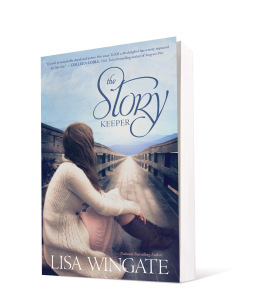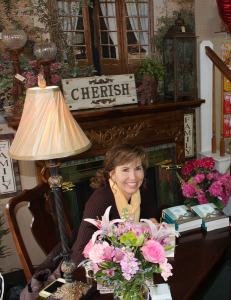Interview With Author Lisa Wingate
This week I am delighted to welcome Lisa Wingate to my weekly interview spotlight. Lisa is a prolific, award-winning, best-selling author who is a Central Texas gal. Her books have skyrocketed to the top of the Christian fiction market in the last few years. Because our  paths seemed to keep crossing in our professional organizations and the fact that we live in the same area, we’ve become friends. She is very generous with her time and expertise. I know you will enjoy getting to know a little more about her. Welcome, Lisa!
paths seemed to keep crossing in our professional organizations and the fact that we live in the same area, we’ve become friends. She is very generous with her time and expertise. I know you will enjoy getting to know a little more about her. Welcome, Lisa!
Don’t forget to leave a comment below, with your email address, between January 6 and January 12, and be entered to win a free copy of her best-selling book, Wildwood Creek! We will announce the winner next week.
First, tell us how were you able to write 20 books in 12 years with a family to take care of?
I’ve always loved to write, but I didn’t get serious about freelance writing and selling until after I’d graduated college, married, and started a family. I wrote and sold various smaller projects between naps, diapers, and playgroups. And when the boys were older, during soccer practices, in carpool lines, while helping with homework, and in all sorts of other situations.
People often ask me if I need quiet in order to write. With boys in the house, if I’d waited for quiet, the writing would never have happened. I learned to lose myself in a story amid the noise of life and I loved it that way.
I asked myself what makes a story last, what really makes a story worth telling and worth reading? I wanted to write books that meant something, that explore the human soul.
One day, I came across a notebook in which I’d written some of my grandmother’s stories. I’d never known quite what to do with those stories, but I knew they were significant in my life. When I rediscovered the notebook, I had the idea of combining my grandmother’s real stories with a fictional family who is like and unlike my own family. That little germ of an idea became my first women’s fiction novel, Tending Roses.
Now that the boys are grown and the house is quiet, I’m redefining the writing routine again. Just as in books, life is a series of scenes and sequels, beginnings and endings, and new discoveries.
 Tell us how your latest book,The Story Keeper, came to be.
Tell us how your latest book,The Story Keeper, came to be.
After turning in the first draft of The Prayer Box, I literally dreamed a story about a young New York editor who finds a forgotten manuscript partial on an old slush pile. She’s captivated by the tale of Sarra, a young Melungeon girl, trapped by dangerous men in turn-of-the-century Appalachia. Sarra’s circumstances in some ways mirror the editor’s painful childhood in the Blue Ridge Mountains. In my dream, the search for the manuscript’s author took her back home after many years away, leading her to a place called Mirror Lake, deep in the mountains.
When I woke, I poured the story concept onto paper, all at once, complete. Over the course of twenty-three novels, I’ve never done that before, and I knew that this story was something special. I was scheduled to meet with my editor the next week, so I took the synopsis along and told her about the dream and the story concept. We agreed to substitute it for the book that was to follow The Prayer Box.
When I contacted my friend and long-time mentor, Ed, to tell him I was writing another Carolina-based book, so I had another project for the two of us, he was elated. I described the location as I’d dreamed it, and gave him the name of the place in the dream – Mirror Lake. Imagine my surprise when Ed wrote back, “The name Mirror Lake really brings back wonderful memories that span time from the sixties to the present. When I was at Clemson, sometimes during the winter, when one of my friends could get a car, we would go to Highlands to ice skate on Mirror Lake. If we could get some dates to go with us, that was all the better. While I didn’t own ice skates nor could I skate, I loved to watch others skate. Mirror Lake and the Highlands area were beautiful places. Those were some great times.”
When that email arrived, I became fully convicted that this story was meant to be. During last year’s book tour, Ed and I took time to drive through the Blue Ridge together, visit Pisgah, Mirror Lake, Stumphouse Tunnel, and many of the old places Ed remembered. We hiked, talked, photographed, and finished our trip by passing through Clemson, where the editor character in the story was given a life-changing scholarship that frees her from family patterns limited by poverty, geographic isolation, and the control of the Church Of the Brethren Saints.
I’d heard fiction authors talk about instances like this–dreaming of a story or a character–and honestly I thought it was a bit bizarre. Honestly, I didn’t really believe them or thought they were highly exaggerated. That is, until I dreamed about one of my own characters who basically told me in my dream that I had misnamed him. I got up the next day, went straight to my computer and renamed the character! So, those of you reading this account, these kinds of things really do happen to fiction authors.
Every book teaches lessons. The Story Keeper is a powerful tale. What are the lessons behind the book?
In many ways, The Story Keeper is an examination of self-identity. It’s about the many masks we wear, where those masks come from, and whether we can leave them behind and become fully authentic. So often, in rejecting the roles our childhood experiences have taught us, we only put on other masks. In the story, Jen believes she has left behind the girl who was raised in poverty in Appalachia and forced to comply with the harsh and cultish practices of the tiny Church Of The Brethren Saints. But in reality, even hundreds of miles away in New York City working her dream job as an editor, Jen’s in hiding from her past and all the painful questions of her childhood.
When she discovers the partial manuscript of The Story Keeper on her desk, she comes face-to-face with the tale of a young girl living a similar life over 100 years ago. That discovery breaches the mask. What Jen really finds in that manuscript isn’t the story of a 16-year-old Melungeon girl trapped in Appalachia at the turn of the century; it’s her own story. That’s why Jen is compelled to go back to the Blue Ridge Mountains in search of the rest of the story. She’s looking for her own truth, for the self she abandoned due to the wounds of her childhood.
That’s what stories can do for us. They can break us open in ways we could never have imagined. I hope that people take away two things away from The Story Keeper. First, on a basic level, I hope that the historical thread in the novel is a reminder of the value of stories and their truly life-changing potential. Our stories shouldn’t go untold. They shouldn’t be lost.
On a deeper level, I hope Jen’s experience resonates with readers who have in some way surrendered to the wounds of a painful childhood. Life behind the mask amounts to slow suffocation. It’s another form of allowing other people to dictate who you are and what you believe. Letting go is a risk, but on the other side of that process lays light, freedom and the glory hour Jen finally senses in the end of the book. I hope that’s what people take away from The Story Keeper. Our lives have purpose, but to fulfill that purpose we must first claim ourselves.
Did your experience as a published author help you to write a character who works in the publishing industry? Was that aspect of the story fun or challenging?
For me, writing about New York publishing from an insider’s point of view was the most fun part of the novel! Over the years, I’ve written for publishers based in New York and several other cities. Every house is different, but there are certainly commonalities in any kind of publishing. It’s an interesting world – a mix of glamor and achingly hard work, of mundane tasks and the Eureka of discovering occasional gold nuggets.
While I had fun dreaming up the uniquely powerful, yet family-owned publishing company that is Vida House in the novel, I’ll admit, it was also a little intimidating to write about the secret inner workings of editors’ lives, all the while knowing that when I was finished, I’d have to turn the manuscript over to… gulp… an editor!
Fortunately, the manuscript passed the agent-and-editor test. Not only that, but friends in publishing loved the idea of tripping over a mysteriously wonderful submission that’s been languishing on a slush pile for 20 years. A fascinating manuscript written by a mysterious author who lives somewhere in the beautiful Blue Ridge Mountains is the ultimate literary gold nugget.
If you could only tell aspiring novelists one thing, what would it be?
Enjoy the time of writing “just for you.” There’s something magical about the purity of writing just because you have a story inside you and you want to put it on paper. The story and the characters are the only things in your head as you work. After you sell your first book, that state of being alone your story doesn’t exist anymore. Along with the story in your head, there are editors, deadlines, book reviewers, readers, financial considerations, agents, contracts, and so forth. All of those are wonderful things. They’re part of our end goal of being published and sharing our stories with the world, but it’s so worthwhile to be cognizant of the gifts of each part of the journey and the purity of its beginning.
Please explain The Sisterhood of the Traveling Books!
In the last months leading up to the September release of The Prayer Box, we (and that’s the royal we, because I can’t remember whose idea it really was) hatched this crazy idea to send 17 early copies of The Prayer Box on journeys all over the country in what we dubbed The Sisterhood Of the Traveling Books. Each traveled through the mail in a Sister Circle of readers. The participants read, they jotted their thoughts right in the pages when they found passages that struck a chord or triggered a memory, they snapped a photo or two, and then they send the book on to the next sister.
The results were amazing, inspiring, and from an author’s point of view, truly heartwarming. The Sisters enjoyed the book in a whole new way because they were reading it together, forming connections, sharing memories, building friendships, linking in their own life experiences by leaving comments in the book. It’s proof of what we all know intuitively. Even those experiences we only live in the pages of a book actually mean more when we share them. The project took on a life of its own in ways we never anticipated, and it has been, without a doubt, the most fun and rewarding thing we’ve ever done in advance of a book.
This year, The Story Keeper traveled in the Sisterhood Of the Traveling Books, visiting towns and cities in over thirty states. Again, the experience was both fun and heartwarming. Books form such amazing connections between us. Others who’d like to get a sense of the journey can find out more on The Sisterhood of the Traveling Books facebook page https://www.facebook.com/groups/SisterhoodOfTheTravelingBooks/ or Pinterest board ww.pinterest.com/lisawingatebook/the-...
This is such a fabulous idea, Lisa! One that many authors would like to emulate, I’m sure.
Where else can readers find you on the Internet?
Lisa’s website: www.Lisawingate.com
Lisa’s newsletter signup: http://visitor.r20.constantcontact.com/manage/optin/ea?v=0018GC6MpVjY0TpvP16_2KxSyrRJByqJCRpyYmRWXZCW3i5gO4vpFWzOU5TC0yqiiw8ZFUeQazAAms%3D
Twitter: http://twitter.com/#!/lisawingate
Facebook: https://www.facebook.com/LisaWingateAuthorPage?ref=br_tf
Thank you so much for being with us. Can’t wait to read The Story Keeper!
Don’t forget to leave a comment below, with your email address, between January 6 and January 12, and be entered to win a free copy of her best-selling book, Wildwood Creek! We will announce the winner next week.
If you enjoyed this post, please share it with your friends and subscribe to my blog and newsletter below. You will receive my modern short story version of ‘Trapped: The Adulterous Woman’ in your thank you email.
The post Interview With Author Lisa Wingate appeared first on Golden Keyes Parsons.
Golden Keyes Parsons's Blog
- Golden Keyes Parsons's profile
- 83 followers




